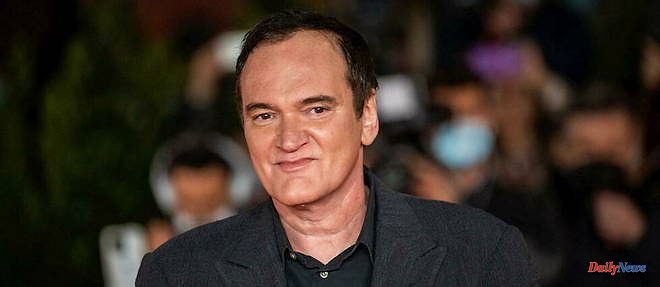Once the sun goes down, when Hollywood Boulevard, invaded by people of the night, turns into Hollywood, Little Q walks through the doors of the Tiffany. It's 1970, the new Hollywood becomes just Hollywood, and the seven-year-old boy, accompanied by his mother and stepfather, attends his very first double screening, the event that will mark his life. In the program ? Joe is also the America of John G. Avildsen and Where's Poppa? by Carl Reiner. Will follow MASH, The Dollar Trilogy, When the Eagles Strike, The Godfather, Inspector Harry, The Owl, Pussycat, Bullitt... So many "adult" films that a child - even accompanied - should never have seen .
What if Connie - Tarantino's mother - had left Little Q alone at home on the nights she went to the Tiffany's? The filmmaker, rather than imagining the worst, prefers to pay homage to all those hours spent in the dark room watching people watch the films as much as the films themselves.
This is the starting point of the stripper Cinema Speculation, released in the fall in the United States and which appears today in French (after a first novel in 2021). An essay tinged with autobiography, a cinema lesson full of anecdotes and considerations as lucid as they are personal and excessive, a collection of memories where fictional heroes and individuals of flesh and bone end up skillfully blending together. All the founding films of Tarantino's cinephilia are there. Each has a chapter that takes us behind the scenes, to the origins of the scenario, where it is still possible to completely change the story. Tireless, excessive as he is in life, the filmmaker analyzes, dissects, remembers details that will have escaped entire generations of spectators. Of course, all his favorite films are mentioned, sometimes at the turn of an argument. For example, The Texas Chainsaw Massacre, a great classic of 1974 horror cinema, which he considers to be one of the only "perfect films" produced by Hollywood.
We can not say that the director is tender with the world of cinema. When he loves, he loves – Paul Schrader, Brian de Palma… – but he doesn't fail to thrash those who haven't had the guts to assert their voice against the Hollywood steamroller. These "they" as he writes, who could have prevented him from making the films he had in mind. When the young filmmaker worked at Video Archives, the Manhattan Beach video club, and shared with his colleagues his dreams of becoming a director, as he cited the example of the opening scene of Matador, by Pedro Almodovar, we dissuade him: “Quentin, they will never let you do that. "Who the fuck are they going to stop me?" They just have to fuck off. »
At the time, he was still just an impertinent film fanatic, convinced that he knew everything. Still, Tarantino recalls, when he became a filmmaker in earnest, there was no question of letting "these people" stop him from doing anything. “Viewers can accept my work or reject it. Judging it good or bad, or being indifferent to it. But I have always approached my cinema with fearlessness, without worrying about the reception that would be reserved for it. And, if there is one who sets an example in this area, it is Pedro Almodovar. "Watching my heroes, the mavericks of American cinema in the seventies, bend to new ways of working just to keep getting a job, I thought that Pedro's boldness made fun of their calculations and their compromise. The movies I dreamed of always had a comedic reaction to something unpleasant. »
Comical, erudite, often caustic, Cinema Speculation also pays a vibrant tribute to criticism, notably through a portrait of the famous Los Angeles Times journalist, Kevin Thomas. According to recent revelations from The Hollywood Reporter, the filmmaker has put the finishing touches on his tenth film, The Movie Critic, which is inspired by the journey of the great critic - as respected as it is feared - of the New York Times, Pauline Kael, who died in 2001. While waiting to find out more, Quentin Tarantino will be at the Grand Rex in Paris on March 29 to host an evening around his book. Big show guaranteed.
Cinema Speculation, Quentin Tarantino, translated from English by Nicolas Richard, Flammarion, 440 pages, €25.
"Yes, I really liked MASH, but part of the fun for me was watching it in a room full of silly adults, all drunk on their own naughtiness. Not to mention the pleasure I felt, at school, describing these scenes to other kids in my class who would never have dared to dream of seeing a film like MASH, French Connection, The Godfather, The Wild Horde or Deliverance (there was usually only one other kid who was allowed to see the crazy movies I was going to see).
Since I was allowed to see things that other kids weren't allowed to see, I was seen as sophisticated in the eyes of my classmates. And since I was watching the most thought-provoking movies from the greatest cinematic period in Hollywood history, they were right, I was a sophisticated person.
At one point, when I realized that I was going to see movies that other parents forbade their children, I asked my mother about it. She answered :
“Quentin, I worry more about you when you watch the news. A movie can't hurt.
Absolutely well said, Connie!
Was I disturbed from being exposed to all these images? Some bothered me, yes, of course! But that didn't mean I didn't like the movie.
When they pulled the corpse of the naked girl in Inspector Harry out of the hole, it was completely unsettling. But I understood.
[…]
Most readers would be flabbergasted if I listed the hyperviolent scenes I was exposed to between 1970 and 1972. Whether it was James Caan machine-gunned to death at the toll booth or Moe Green being shot in the eye in The Godfather. The guy cut in half by the airplane propeller in Catch 22. Stacy Keach dragged by a speeding car in Cops Don't Sleep at Night. Or Don Stroud shooting himself with a submachine gun in the face in Bloody Mama. But simply listing grotesque moments – without putting them into context – isn't entirely fair to the films in question. And my mother – as she explained to me afterwards – always took the side of taking the context into account. In the movies mentioned above, I was able to cash in on the footage because I understood the story.
[…]
Was there a movie back then that I couldn't stand?
Yes.
Bambi.
Bambi losing his mother, killed by a hunter, and this horrible forest fire, all that upset me more than anything I had seen in the cinema. I had to wait until 1974 and Wes Craven's The Last House on the Left to feel anything like it. These Bambi sequences have been screwing up kids for decades now. But I think I know why Bambi traumatized me so much. Of course, every kid is touched in the heart when Bambi loses his mother. But I think what hit me hard, even more than the psychological dynamics of the story, was the shock of the unexpected tragedy. The trailers on TV did not at all suggest the true nature of the film. They insisted instead on the adorable antics of Bambi and Pan-Pan. Nothing prepared me for the poignant turn that events were about to take. I remember my little brain screaming "Nah but what the fuck is going on here? - in a five-year-old boy's version. If I had been better prepared for what I was about to see, I think I would have taken it differently. »
"Like the generation of the Movie Brats that succeeded them, these anti-establishment filmmaker-writers also watched old movies as children. But unlike Bogdanovitch, Spielberg, Scorsese and Big John Milius , when this generation of filmmakers watched old movies on TV, they weren't thrilled with what they saw.When watching John Ford's Westerns, this generation was generally appalled by the display of white supremacy mixed with jingoism. When this generation watched Prisoner of the Desert, they didn't see a torn man trying to find his place in a society that was past its expiration date. They saw a movie about a racist bastard hating Indians, who are offered absolution as a last resort by a grateful (white) community.And she saw a director who co-signed absolution and expected the audience to do the same.
They rejected the morals of Ford's ending Fort Apache Massacre. When the genocidal cavalry officer played by Henry Fonda is worshiped in death in the name of cavalry, esprit de corps and white America.
Anti-establishment filmmakers-writers wanted to remake John Ford movies, but not in the way Scorsese and Schrader did with Taxi Driver and Hardcore. They wanted to remake The Massacre of Fort Apache but from the point of view of the Apaches. And in the case of Arthur Penn with Little Big Man, Ralph Nelson with Blue Soldier, and Robert Aldrich (not post-sixties, not really a hippie, but absolutely anti-establishment) with Apache Fury, they got it. do.
The motivation for making historical films in this new climate was to finally be able to examine and show the history of fascism, racism and hypocrisy in America. All of which Old Hollywood had spent fifty years hiding in the photos of the past."












